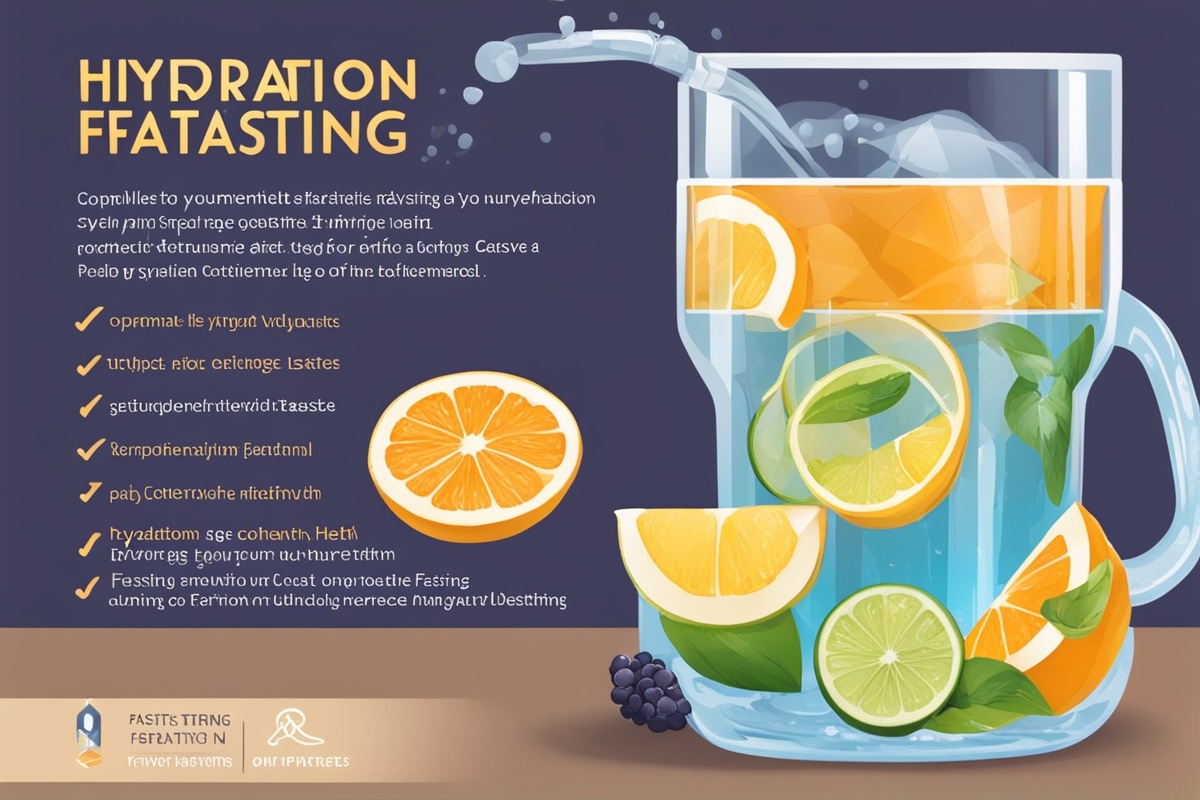Fasting, whether for religious, health, or weight loss reasons, is a practice that requires careful attention to hydration. Maintaining optimal water intake while fasting is crucial to support bodily functions, prevent dehydration, and ensure overall well-being. In this post, we’ll explore the importance of hydration during fasting, how much water you should drink, and practical tips to stay hydrated without breaking your fast.
Why Hydration Matters During Fasting
When you fast, your body is deprived of food, and in some cases, water, for extended periods. This can lead to dehydration if not managed properly. Water plays a vital role in regulating body temperature, flushing out toxins, and supporting digestion—even when you’re not eating. Without optimal water intake while fasting, you may experience symptoms like fatigue, headaches, dizziness, or dry mouth. Staying hydrated helps mitigate these risks and keeps your energy levels stable.
Additionally, during fasting, your body relies on stored energy reserves, and water helps facilitate metabolic processes like fat breakdown. Dehydration can slow these processes, making fasting feel more challenging than necessary.
How Much Water Should You Drink While Fasting?
Determining the optimal water intake while fasting depends on several factors, including your body weight, activity level, climate, and the type of fast you’re following. For instance, during intermittent fasting, you may have windows where water is allowed, while religious fasts like Ramadan may restrict water intake during daylight hours.
As a general guideline, the National Academies of Sciences, Engineering, and Medicine suggests that men should aim for about 3.7 liters (125 ounces) and women about 2.7 liters (91 ounces) of water per day from all sources, including food. Since food is absent during fasting, you’ll need to focus on meeting these needs through fluids alone during permitted times. A practical approach is to drink 8–10 glasses of water (about 2–3 liters) during non-fasting hours, adjusting based on your personal needs.
If you’re unsure how much water you need, listen to your body. Thirst, dark urine, or dry skin are signs you may need to increase your intake. For more on hydration needs, check out our post on Daily Hydration Tips for a Healthy Lifestyle.
Best Times to Hydrate During Fasting
Timing is key to achieving optimal water intake while fasting, especially in fasts with restricted hours for drinking. For intermittent fasting, sipping water throughout your fasting window (if allowed) can help curb hunger and maintain hydration. For religious fasts like Ramadan, focus on hydrating during non-fasting hours—before sunrise (Suhoor) and after sunset (Iftar).
Start your day with a large glass of water during Suhoor to prepare your body for the fasting period. After breaking your fast at Iftar, prioritize rehydration by drinking water before consuming heavy meals, as this aids digestion. Spread out your water intake over the evening to avoid overloading your stomach. For additional strategies, read our guide on Hydration Schedules for Intermittent Fasting.
Can You Drink Other Fluids While Fasting?
Water is the best choice for hydration during fasting because it’s calorie-free and doesn’t interfere with the metabolic benefits of fasting. However, certain zero-calorie beverages like black coffee, unsweetened tea, or electrolyte solutions (without sugar) may be acceptable during some fasting protocols, such as intermittent fasting. Be cautious, though, as caffeine can have a diuretic effect, potentially increasing dehydration risk.
For strict fasts, such as those for religious purposes, it’s important to adhere to the guidelines of your practice, which may prohibit anything but water or even water itself during certain hours. If you’re exploring fasting for health reasons, consult our article on What Breaks a Fast: A Beginner’s Guide for clarity on what fluids are fasting-friendly.
Tips for Maintaining Optimal Water Intake While Fasting
Staying hydrated during fasting can be challenging, but with the right strategies, you can ensure your body gets the water it needs. Here are some practical tips:
- Carry a Water Bottle: Keep a reusable water bottle with you during non-fasting hours to remind yourself to sip regularly.
- Add Natural Flavor: If plain water feels boring, infuse it with cucumber, lemon, or mint for a refreshing taste without adding calories.
- Monitor Your Urine: Pale yellow urine typically indicates good hydration, while dark yellow suggests you need more fluids.
- Avoid Overhydration: Drinking too much water too quickly can lead to discomfort or a condition called hyponatremia. Spread out your intake evenly.
For more hydration hacks, explore our post on Creative Ways to Stay Hydrated.
Signs of Dehydration to Watch For
Even with the best intentions, dehydration can sneak up on you during fasting if you’re not mindful of your water intake. Recognizing the early signs can help you take action before the situation worsens. Common symptoms include:
- Thirst or dry mouth
- Fatigue or lethargy
- Headaches or dizziness
- Dark-colored urine
- Dry skin or lips
If you experience severe symptoms like confusion, rapid heartbeat, or fainting, seek medical attention immediately, as these may indicate severe dehydration. To learn more about dehydration risks, refer to our detailed guide on Understanding Dehydration Symptoms and Solutions.
Disclaimer: The information provided in this article is for general informational purposes only and should not be considered medical advice. Fasting and hydration needs vary by individual, and certain medical conditions or dietary restrictions may require personalized guidance. Always consult with a healthcare professional or dietitian before starting any fasting regimen or making significant changes to your water intake, especially if you have pre-existing health conditions or are pregnant or breastfeeding.
References
- National Academies of Sciences, Engineering, and Medicine – Dietary Reference Intakes for Water
- Mayo Clinic – Dehydration Symptoms and Causes
- Harvard Health Publishing – The Importance of Staying Hydrated
- Centers for Disease Control and Prevention – Water and Healthier Drinks
- World Health Organization – Drinking Water Fact Sheet
This content is for informational purposes only and not a substitute for professional advice.






